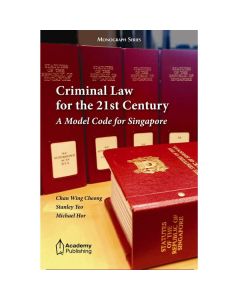-
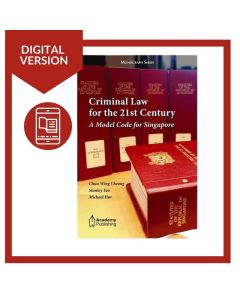
Please note that the digital copy can only be accessed via Academy Library, SAL’s proprietary eBook reader. The digital copy cannot be downloaded and is not available in any other format (e.g. PDF). For more information, please visit our FAQ page.
In this book, the authors propose a set of improved and modernised provisions expressing the general principles of criminal responsibility. This set of principles will comprise a “General Part” which, it is proposed, will form part of Singapore’s Penal Code. The key objective of devising and enacting the General Part is to significantly revitalise the Penal Code and restore many of its original technical attributes. Each chapter of this book comprises: (a) a carefully considered and drafted provision on a general principle of criminal responsibility; (b) a summary of the existing law in Singapore pertaining to that principle; (c) a selection of recent formulations of that principle from other jurisdictions to benchmark Singapore’s law (both current and proposed) with international best practices; and (d) a comparison of these formulations with the provision proposed in this book for inclusion as a General Part in Singapore’s Penal Code.
Author(s)/Editor(s)/Contributor(s): Chan Wing Cheong, Stanley Yeo and Michael HorYear of Publication: 2013
Page Extent: 408 pages
Member's Price: $80.00 (before GST)
Associate Student's Price: $64.00 (before GST)
Non-Member's Price: $120.00 (before GST)Criminal Law for the 21st Century – A Model Code for Singapore DigitalMember's Price: SGD 87.20Usual Price: SGD 130.80CS -
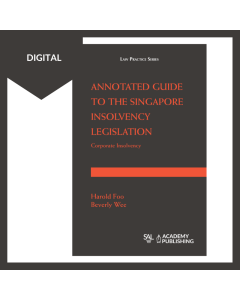
Please note that the digital copy can only be accessed via Academy Library, SAL’s proprietary eBook reader. The digital copy cannot be downloaded and is not available in any other format (e.g. PDF). For more information, please visit our FAQ page.
Singapore’s insolvency and debt restructuring framework has undergone tremendous change in the last decade. From the incorporation of elements of the US Chapter 11 bankruptcy regime and adoption of the UNCITRAL Model Law on Cross-Border Insolvency, to the restriction of the application of ipso facto clauses, these reforms ensure that the regime continues to remain responsive to the needs of debtors, creditors and the economy.
With the coming into force of the Insolvency Restructuring and Dissolution Act 2018 in July 2020, the Act consolidates the personal and corporate insolvency provisions, previously found in two separate statutes, into a single piece of legislation. This also represents the culmination of various phases of legislative reform – building on earlier amendments to the now repealed Bankruptcy Act and Companies Act.
As Singapore’s principal insolvency legislation and one of the largest standalone bills introduced in Parliament, Annotated Guide to the Singapore Insolvency Legislation – Corporate Insolvency provides detailed commentary on the various provisions in the Act in a simple and clear manner. This includes references to case law, comparable legislation and law reform recommendations.
Authored by the persons who worked on the Act, this offers an authoritative and comprehensive account not only for insolvency professionals, but also anyone seeking a starting point to better understand the Act.
Year of Publication: 2023
Page Extent: 920 pages
Member's Price: $90.00 (before GST)
Associate Student's Price: $72.00 (before GST)
Non-Member's Price: $135.00 (before GST)
To purchase the Print + Digital bundle, please click here.
Annotated Guide to the Singapore Insolvency Legislation DigitalMember's Price: SGD 98.10Usual Price: SGD 147.15CS -
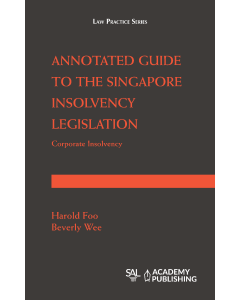
Singapore’s insolvency and debt restructuring framework has undergone tremendous change in the last decade. From the incorporation of elements of the US Chapter 11 bankruptcy regime and adoption of the UNCITRAL Model Law on Cross-Border Insolvency, to the restriction of the application of ipso facto clauses, these reforms ensure that the regime continues to remain responsive to the needs of debtors, creditors and the economy.
With the coming into force of the Insolvency Restructuring and Dissolution Act 2018 in July 2020, the Act consolidates the personal and corporate insolvency provisions, previously found in two separate statutes, into a single piece of legislation. This also represents the culmination of various phases of legislative reform – building on earlier amendments to the now repealed Bankruptcy Act and Companies Act.
As Singapore’s principal insolvency legislation and one of the largest standalone bills introduced in Parliament, Annotated Guide to the Singapore Insolvency Legislation – Corporate Insolvency provides detailed commentary on the various provisions in the Act in a simple and clear manner. This includes references to case law, comparable legislation and law reform recommendations.
Authored by the persons who worked on the Act, this offers an authoritative and comprehensive account not only for insolvency professionals, but also anyone seeking a starting point to better understand the Act.
Year of Publication: 2023
Page Extent: 920 pages
Member's Price: $90.00 (before GST)
Associate Student's Price: $72.00 (before GST)
Non-Member's Price: $135.00 (before GST)
Annotated Guide to the Singapore Insolvency LegislationMember's Price: SGD 98.10Usual Price: SGD 147.15CS -
![[Bundle] Annotated Guide to the Singapore Insolvency Legislation (Print + Digital)](https://d2oj3wdaa1r7o5.cloudfront.net/catalog/product/cache/2765542505660baab28ecd555e27366e/p/r/print_digital_bundle_annotated_guide_1.png)
Please note that the digital copy can only be accessed via Academy Library, SAL’s proprietary eBook reader. The digital copy cannot be downloaded and is not available in any other format (e.g. PDF). For more information, please visit our FAQ page.
Singapore’s insolvency and debt restructuring framework has undergone tremendous change in the last decade. From the incorporation of elements of the US Chapter 11 bankruptcy regime and adoption of the UNCITRAL Model Law on Cross-Border Insolvency, to the restriction of the application of ipso facto clauses, these reforms ensure that the regime continues to remain responsive to the needs of debtors, creditors and the economy.
With the coming into force of the Insolvency Restructuring and Dissolution Act 2018 in July 2020, the Act consolidates the personal and corporate insolvency provisions, previously found in two separate statutes, into a single piece of legislation. This also represents the culmination of various phases of legislative reform – building on earlier amendments to the now repealed Bankruptcy Act and Companies Act.
As Singapore’s principal insolvency legislation and one of the largest standalone bills introduced in Parliament, Annotated Guide to the Singapore Insolvency Legislation – Corporate Insolvency provides detailed commentary on the various provisions in the Act in a simple and clear manner. This includes references to case law, comparable legislation and law reform recommendations.
Authored by the persons who worked on the Act, this offers an authoritative and comprehensive account not only for insolvency professionals, but also anyone seeking a starting point to better understand the Act.
Year of Publication: 2023
Page Extent: 920 pages
Member's Price: $117.00 (before GST)
Associate Student's Price: $93.60 (before GST)
Non-Member's Price: $175.50 (before GST)
For the Print version, please click here.
For the Digital version, please click here.
[Bundle] Annotated Guide to the Singapore Insolvency Legislation (Print + Digital) Member's Price: SGD 127.53Usual Price: SGD 191.30CS -
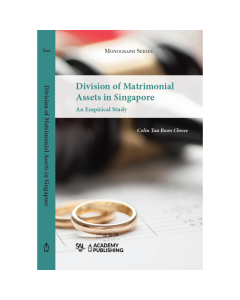
How have Singapore’s courts navigated the evolving and often contentious landscape of division of matrimonial assets upon divorce? Through an extensive empirical study of matrimonial cases in Singapore, this monograph offers fresh insights into the historical and jurisprudential development of the division of matrimonial assets in its courts. It examines how legal reforms – from the Women’s Charter amendments in 1980 and 1996 to the “structured approach” introduced in ANJ v ANK (2015) – have influenced judicial practices in this area of Singapore family law. By drawing on comprehensive datasets on local matrimonial cases, it proposes a principled methodology for equitable asset division grounded in partnership law principles. Essential reading for family law judges and practitioners, policymakers, and social workers, this work is a key resource for stakeholders in the family law community in Singapore.
Author: Colin Tan Boon Chwee
Year of Publication: 2025
Page Extent: 320 pages
Member's Price: $60.00 (before GST)
Associate Student's Price: $48.00 (before GST)
Non-Member's Price: $90.00 (before GST)Get the Print + Digital bundle here.
Division of Matrimonial Assets in Singapore: An Empirical StudyMember's Price: SGD 65.40Usual Price: SGD 98.10CS -
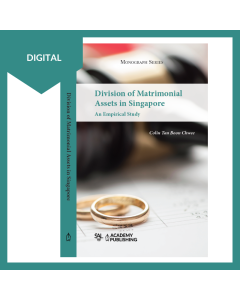
Please note that the digital copy can only be accessed via Academy Library, SAL’s proprietary eBook reader. The digital copy cannot be downloaded and is not available in any other format (e.g. PDF). For more information, please visit our FAQ page.
How have Singapore’s courts navigated the evolving and often contentious landscape of division of matrimonial assets upon divorce? Through an extensive empirical study of matrimonial cases in Singapore, this monograph offers fresh insights into the historical and jurisprudential development of the division of matrimonial assets in its courts. It examines how legal reforms – from the Women’s Charter amendments in 1980 and 1996 to the “structured approach” introduced in ANJ v ANK (2015) – have influenced judicial practices in this area of Singapore family law. By drawing on comprehensive datasets on local matrimonial cases, it proposes a principled methodology for equitable asset division grounded in partnership law principles. Essential reading for family law judges and practitioners, policymakers, and social workers, this work is a key resource for stakeholders in the family law community in Singapore.
Author: Colin Tan Boon Chwee
Year of Publication: 2025
Page Extent: 320 pages
Member's Price: $60.00 (before GST)
Associate Student's Price: $48.00 (before GST)
Non-Member's Price: $90.00 (before GST)Get the Print + Digital bundle here.
Division of Matrimonial Assets: An Empirical Study DigitalMember's Price: SGD 65.40Usual Price: SGD 98.10CS -
![[Bundle] Division of Matrimonial Assets: An Empirical Study](https://d2oj3wdaa1r7o5.cloudfront.net/catalog/product/cache/2765542505660baab28ecd555e27366e/d/o/doma_bundless.jpg)
Please note that the digital copy can only be read on Academy Library, SAL’s proprietary eBook reader. It is not available in any other format (e.g. PDF). For more information, please visit our FAQ page.
How have Singapore’s courts navigated the evolving and often contentious landscape of division of matrimonial assets upon divorce? Through an extensive empirical study of matrimonial cases in Singapore, this monograph offers fresh insights into the historical and jurisprudential development of the division of matrimonial assets in its courts. It examines how legal reforms – from the Women’s Charter amendments in 1980 and 1996 to the “structured approach” introduced in ANJ v ANK (2015) – have influenced judicial practices in this area of Singapore family law. By drawing on comprehensive datasets on local matrimonial cases, it proposes a principled methodology for equitable asset division grounded in partnership law principles. Essential reading for family law judges and practitioners, policymakers, and social workers, this work is a key resource for stakeholders in the family law community in Singapore.
Author: Colin Tan Boon Chwee
Year of Publication: 2025
Page Extent: 320 pages
Member's Price: $78.00 (before GST)
Associate Student's Price: $62.40 (before GST)
Non-Member's Price: $117.00 (before GST)[Bundle] Division of Matrimonial Assets: An Empirical Study Member's Price: SGD 85.02Usual Price: SGD 127.54CS -
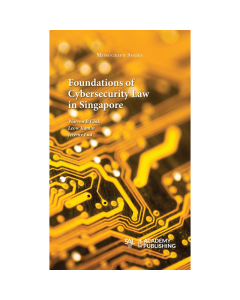
The book offers a detailed examination of Singapore’s legal and policy framework for cybersecurity, starting with an overview of the Cybersecurity Act 2018, complementary legislation, and national strategies for resilience and innovation. Subsequent chapters address common attack vectors and vulnerabilities that lawyers ought to be aware of, legal issues connected with responses to a cybersecurity incident, civil liability and remedies stemming from cybersecurity incidents, as well as civil liabilities of victims of cybersecurity incidents and alternative dispute resolution.
The final chapters look into the objectives of computer-related offences, and provide reflections on Singapore’s cybersecurity approach and legal framework as well as the challenges policy and law makers face in the fight against increasingly sophisticated cyber criminals.
Authors: Leow Jiamin, Warren B Chik, Jeremy Lua
Year of Publication: 2025
Page Extent: 262 pages
Member's Price: $60.00 (before GST)
Associate Student's Price: $48.00 (before GST)
Non-Member's Price: $90.00 (before GST)Get the Print + Digital bundle here.
-
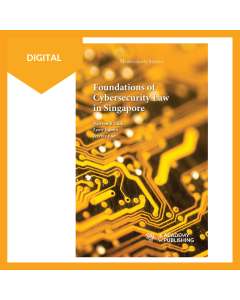
Please note that the digital copy can only be accessed via Academy Library, SAL’s proprietary eBook reader. The digital copy cannot be downloaded and is not available in any other format (e.g. PDF). For more information, please visit our FAQ page.
The book offers a detailed examination of Singapore’s legal and policy framework for cybersecurity, starting with an overview of the Cybersecurity Act 2018, complementary legislation, and national strategies for resilience and innovation. Subsequent chapters address common attack vectors and vulnerabilities that lawyers ought to be aware of, legal issues connected with responses to a cybersecurity incident, civil liability and remedies stemming from cybersecurity incidents, as well as civil liabilities of victims of cybersecurity incidents and alternative dispute resolution.
The final chapters look into the objectives of computer-related offences, and provide reflections on Singapore’s cybersecurity approach and legal framework as well as the challenges policy and law makers face in the fight against increasingly sophisticated cyber criminals.
Authors: Leow Jiamin, Warren B Chik, Jeremy Lua
Year of Publication: 2025
Page Extent: 262 pages
Member's Price: $60.00 (before GST)
Associate Student's Price: $48.00 (before GST)
Non-Member's Price: $90.00 (before GST)Get the Print + Digital bundle here.
Foundations of Cybersecurity Law in Singapore DigitalMember's Price: SGD 65.40Usual Price: SGD 98.10CS -
![[Bundle] Foundations of Cybersecurity Law in Singapore](https://d2oj3wdaa1r7o5.cloudfront.net/catalog/product/cache/2765542505660baab28ecd555e27366e/f/o/foundations_of_cybersecurity_of_law_in_singapore_bundle.png)
Please note that the digital copy can only be read on Academy Library, SAL’s proprietary eBook reader. It is not available in any other format (e.g. PDF). For more information, please visit our FAQ page.
The book offers a detailed examination of Singapore’s legal and policy framework for cybersecurity, starting with an overview of the Cybersecurity Act 2018, complementary legislation, and national strategies for resilience and innovation. Subsequent chapters address common attack vectors and vulnerabilities that lawyers ought to be aware of, legal issues connected with responses to a cybersecurity incident, civil liability and remedies stemming from cybersecurity incidents, as well as civil liabilities of victims of cybersecurity incidents and alternative dispute resolution.
The final chapters look into the objectives of computer-related offences, and provide reflections on Singapore’s cybersecurity approach and legal framework as well as the challenges policy and law makers face in the fight against increasingly sophisticated cyber criminals.
Authors: Leow Jiamin, Warren B Chik, Jeremy Lua
Year of Publication: 2025
Page Extent: 262 pages
Member's Price: $78.00 (before GST)
Associate Student's Price: $62.40 (before GST)
Non-Member's Price: $117.00 (before GST)[Bundle] Foundations of Cybersecurity Law in Singapore Member's Price: SGD 85.02Usual Price: SGD 127.54CS -
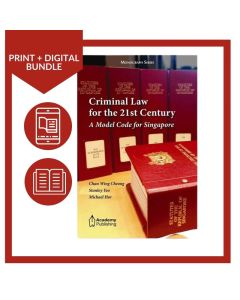
Please note that the digital copy can only be accessed via Academy Library, SAL’s proprietary eBook reader. The digital copy cannot be downloaded and is not available in any other format (e.g. PDF). For more information, please visit our FAQ page.
In this book, the authors propose a set of improved and modernised provisions expressing the general principles of criminal responsibility. This set of principles will comprise a “General Part” which, it is proposed, will form part of Singapore’s Penal Code. The key objective of devising and enacting the General Part is to significantly revitalise the Penal Code and restore many of its original technical attributes. Each chapter of this book comprises: (a) a carefully considered and drafted provision on a general principle of criminal responsibility; (b) a summary of the existing law in Singapore pertaining to that principle; (c) a selection of recent formulations of that principle from other jurisdictions to benchmark Singapore’s law (both current and proposed) with international best practices; and (d) a comparison of these formulations with the provision proposed in this book for inclusion as a General Part in Singapore’s Penal Code.
Author(s)/Editor(s)/Contributor(s): Chan Wing Cheong, Stanley Yeo and Michael HorYear of Publication: 2013
Page Extent: 408 pages
Member's Price: $104.00 (before GST)
Associate Student's Price: $83.20 (before GST)
Non-Member's Price: $156.00 (before GST)

 Sign in
Sign in
